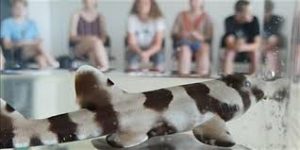
High school education should be engaging, inspiring, and relevant. What better way to achieve these goals than by incorporating the fascinating world of the ocean into the curriculum? Take students on a journey beneath the waves, exploring the depths of marine biology, environmental science, and more. In this blog, we’ll explore why the ocean is a great theme for high schools, and we’ll dive deep into some captivating ocean-themed lesson ideas.
The ocean covers more than 70% of our planet, making it a critical part of our global ecosystem. Teaching about the ocean connects students to real-world issues like climate change, biodiversity, and conservation. Using the ocean as a theme we bring real-world relevance to learning. This is particulary possible where we are based in South East Queensland, as we can dive deep into local case studies such as the Great Barrier Reef and the annual humpback whale migration.
Why Teach with an Ocean Theme?
There are a number of reasons why teaching with an ocean theme benefits students’ learning. These include…
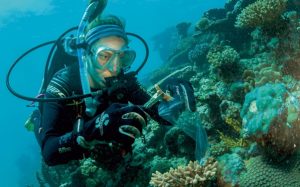
Inspiring STEM Education: It offers hands-on opportunities for scientific inquiry and exploration, sparking students’ interest in further study and STEM careers.
Environmental Stewardship: By studying the ocean and its challenges, students develop a sense of environmental responsibility. They learn about the importance of protecting our oceans and become more conscious of their ecological footprint. Nurturing Ocean Stewards.
Cross-subject Learning: Ocean-themed lessons naturally integrate various subjects, such as science and geography. This interdisciplinary approach enriches students’ understanding and helps them see the connections between different fields of study.
Ocean Themed Lesson Ideas
Below are some great lesson ideas which may be supported by Ocean Life Education incursions or excursions.
Classification – Exploring the Diversity of Life
Uncover the vast range of marine species that inhabit the ocean and their unique characteristics. Students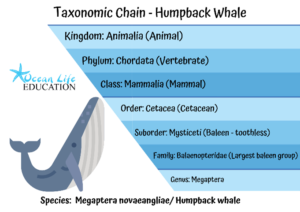 learn about why and how we classify and order species, enhancing understanding of the diversity of the underwater world and discovering similarities with our own, all while gaining hands-on experience with our captivating live animal team – turtles, an epaulette shark, sea stars, sea urchins, sea cucumbers.
learn about why and how we classify and order species, enhancing understanding of the diversity of the underwater world and discovering similarities with our own, all while gaining hands-on experience with our captivating live animal team – turtles, an epaulette shark, sea stars, sea urchins, sea cucumbers.
Follow up: Students can explore marine biodiversity and dive into the incredible diversity of life in the ocean. From microscopic plankton to magnificent whales, students can research and present on different marine species.
Unravelling Energy Flows: Food Chains, Food Webs, and Ecosystems
Students explore food chains and food webs, delving deep into the fascinating relationships of who consumes whom within an ecosystem and how energy flows. Within each ecosystem, every organism occupies a distinct trophic level or position in the food chain or web. We explore the trophic pyramid, spanning from producers to primary, secondary, and tertiary consumers, and even apex predators, all the way down to the vital decomposers. This lesson also touches on the concept of the interdependence of species.
Follow up: Students can choose a marine species of their choice and create a detailed food web infographic.
Human Impact on the Ocean – Ocean Pollution & Conservation 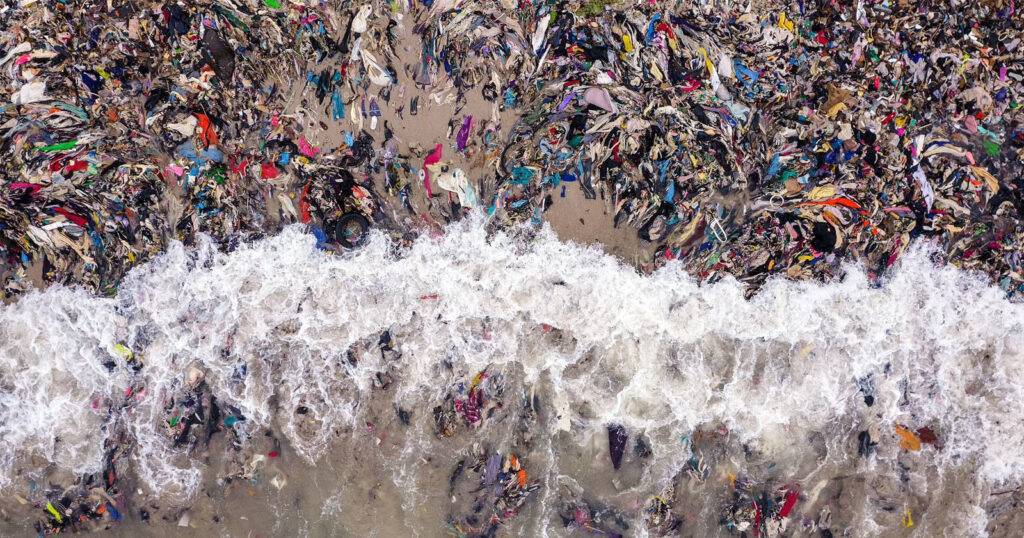
Examine the profound influence of human activities on our oceans, including plastic pollution, overfishing, and oil spills. Understand how our actions have reshaped these vital ecosystems and learn about the strategies and solutions needed to protect our marine environment for future generations. As our society has expanded and evolved, the repercussions of our actions have rippled through ecosystems, biodiversity, climate patterns, and more.
Follow up: Discuss local conservation efforts and solutions and encourage students to brainstorm ways they can contribute to ocean protection.
Read our blog: Nurturing Ocean Stewards.
Investigate Adaptation – Exploring the Extraordinary Evolution of Marine Life
We journey into the world of marine organisms and their remarkable ability to evolve and adapt to their ever-changing environment, ensuring their survival. We highlight specific adaptations like camouflage and students learn about the incredible survival strategies that have allowed creatures to thrive in some of the ocean’s most challenging habitats.
Follow up: Students apply their learning to an ocean animal of choice and examine how it has adapted to its environment.
Hands-On Learning and Field Trips
To truly immerse students in ocean-themed curriculum topics, consider incorporating hands-on learning experiences and field trips: 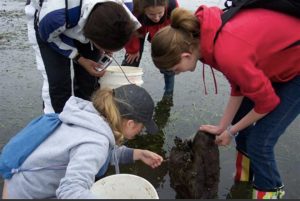
Ocean Life Incursion: Our programs are tailored to the curriculum and offer an up-close look at marine life and ecosystems in an interactive manner.
Ocean life Education Excursions: Where proximity permits, we take students to the coastline to examine topics such as biodiversity and ecosystems, adaptation and human impact.
Beach Cleanups: Organize school beach cleanup events to teach students about the impact of plastic pollution on coastal environments and wildlife.
Guest Speakers: Invite marine scientists, conservationists, or local experts to speak to your class about their work and research in the field of marine science.
Link to blog: How to get Involved in a SE Queensland Beach Clean
Bring Local Real-World Relevance to Learning 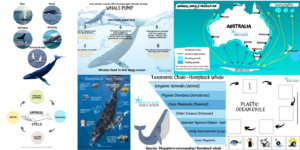
In Queensland, Australia, The Great Barrier is an excellent example to use as a basis for studying key curriculum themes, connecting students to real-world issues like climate change, biodiversity and ecosystems, and conservation. In addition, we are incredibly lucky to have over twenty thousand humpback whales migrate along our coast each year. This incredible spectacle can be used to inspire kids and for case studies covering a wide range of curriculum themes.
Teaching curriculum topics with an ocean theme not only engages high school students but also empowers them to become informed and environmentally conscious global citizens. Through interdisciplinary lessons, hands-on experiences, and a focus on local real-world issues, educators can inspire the next generation of scientists, conservationists, and ocean enthusiasts. So, take the plunge and let the ocean be your classroom—it’s a journey worth exploring!
Other Useful links
Ocean Life Education Programs & Events
Local Conservation Groups
- Coolum Beach – Beach Clean Ups Sunshine Coast & Coolum and North Shore Coast Care
- North Shore Beach & Yaroomba Beach – North Shore Clean Up Crew
- Mooloolaba Beach – Plastic Free Sunshine Coast
- Golden Beach – Visionary Ocean Warriors
- Noosa – Our Biosphere
Or Brisbane
- Brisbane – Ocean Crusaders


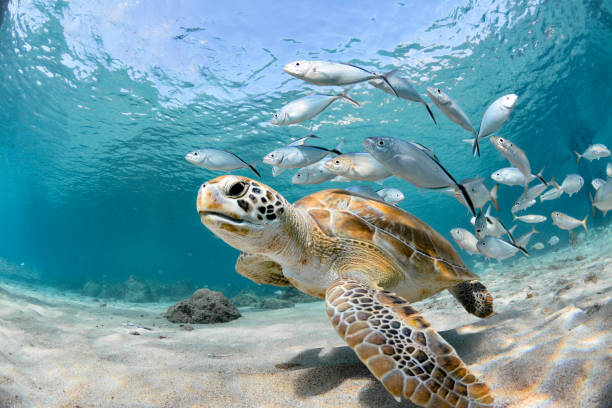
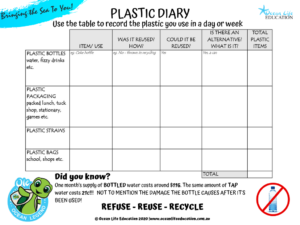 Help children understand the connection between their daily actions and the health of the ocean. Discuss activities such as plastic consumption, waste disposal, and carbon emissions. Engage them in thought-provoking discussions about how seemingly small choices can have significant consequences for marine ecosystems.
Help children understand the connection between their daily actions and the health of the ocean. Discuss activities such as plastic consumption, waste disposal, and carbon emissions. Engage them in thought-provoking discussions about how seemingly small choices can have significant consequences for marine ecosystems. 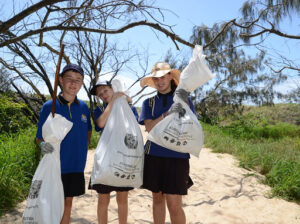 Explore the vibrant world of coral reefs and their vulnerability to climate change. Discuss coral bleaching and its connection to rising ocean temperatures. Encourage students to brainstorm ways to reduce their carbon footprint and advocate for sustainable practices.
Explore the vibrant world of coral reefs and their vulnerability to climate change. Discuss coral bleaching and its connection to rising ocean temperatures. Encourage students to brainstorm ways to reduce their carbon footprint and advocate for sustainable practices. 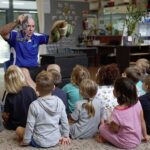 Why not book in one of our inspirational Ocean Life Education Programs or Events?
Why not book in one of our inspirational Ocean Life Education Programs or Events?